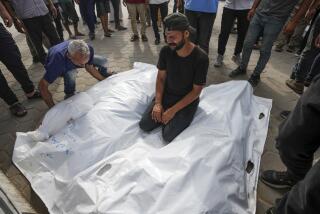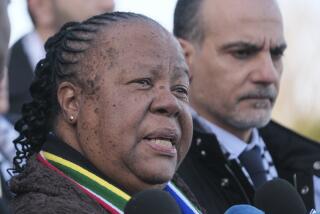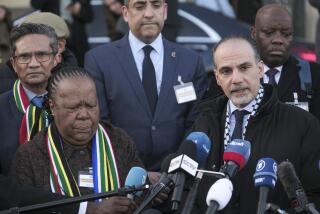Nuclear Virus
South African President Pieter W. Botha may or may not be sincere in his announcement that his government might soon sign a treaty intended to curb the spread of nuclear weapons. The timing of his statement, coinciding as it did with South African efforts to avoid expulsion from the International Atomic Energy Agency, amply justifies skepticism.
However, if Botha follows through on his promise to begin talks looking toward South African adherence to the 1970 Nuclear Nonproliferation Treaty, it could be an extremely important development. Specifically, it would give Washington valuable leverage in its efforts to avoid a nuclear-arms race on the Indian subcontinent.
Along with India, Pakistan and Israel, South Africa is on everybody’s list of countries that have refused to sign the nonproliferation treaty and are suspected of either having nuclear weapons or working to build the capacity to make them. South Africa has two French-built power reactors and a research reactor that already are subject to international inspections aimed at preventing the diversion of nuclear materials to weapons production. But its main nuclear-research facility, near Pretoria, has been hidden from foreign scrutiny.
The South Africans have refused to confirm or deny rumors that they have collaborated with Israel in the development of nuclear weapons. The Israelis are widely believed to have a stockpile of nuclear-weapons components ready for assembly.
Meanwhile, the Reagan Administration has officially said that Pakistan is on the threshold of nuclear-weapons possession, and there is a strong move afoot in Congress to withhold military aid until Pakistan offers credible assurances that its nuclear-bomb development program has been dismantled.
The Pakistanis deny that they have a nuclear-weapons program, but ask why the United States does not lean as hard on India--which exploded a nuclear device in 1974--as on Pakistan.
It’s a fair question. President Reagan discussed the nuclear issue this week with visiting Prime Minister Mohammed Khan Junejo of Pakistan. He should press the issue with equal force when Indian Prime Minister Rajiv Gandhi comes calling on Oct. 20. A South African decision to sign the nonproliferation treaty and accept its international safeguard provisions would leave the Indians and Pakistanis with fewer excuses for remaining on the list of suspect nations.
More to Read
Sign up for Essential California
The most important California stories and recommendations in your inbox every morning.
You may occasionally receive promotional content from the Los Angeles Times.










